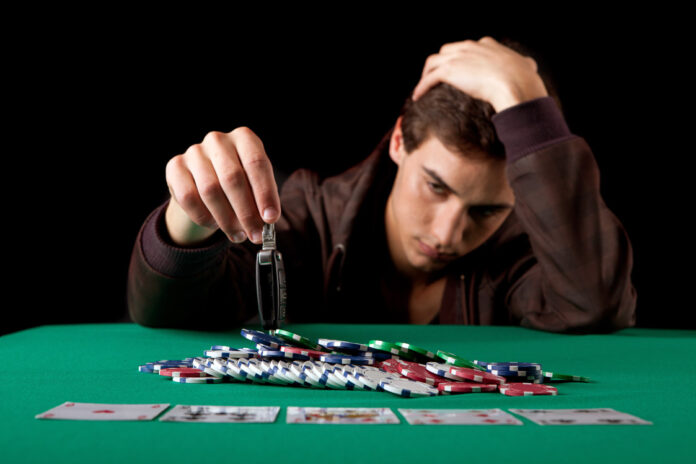
Betting is a popular and for some a successful form of entertainment almost all over the planet. It has been popular for centuries in many cultures, so we are not surprised by the fact that the psychology of betting is a term that is often mentioned. It is discussed in gambling circles, as well as among numerous doctors and psychologists. Especially the latter always wanted to discover the following – why do people gamble when, in the end, “the house always wins”?
This psychological phenomenon is incomprehensible to many. And still, even after numerous studies, the question of why do people continue to gamble/bet when there is a huge probability that they will lose money remains.
Everything Comes With a Price

For a small group of people, gambling/betting is a habit they cannot control. Problematic (or pathological) gambling is a recognized psychiatric addiction disorder present in about 1 % of the population.
When doctors ask psychology students why they think people gamble, the most common answers are for pleasure, money, or excitement. While these may be the reasons why people gamble in the beginning, psychologists still cannot figure out for sure why betting or gambling becomes a matter of habit for some.
The Beginner’s Luck
Of course, we have all heard the term “beginner’s luck”. When it comes to betting psychology, this term is often mentioned. A large number of punters who are just starting to bet achieve a streak of several consecutive wins. They manage to increase the amount of money in their wallets very quickly, and that, of course, becomes tempting. However, every successful streak is interrupted at one point and that leads to the first loss.
One of the main mistakes that are made in these situations is that these players try to return the lost money at any cost. They abandon the previous strategy that brought them success and abruptly increase the payment amount without any thinking and analysis. It can be especially dangerous in online betting when only a click separates players from transferring money to their accounts at the bookmakers, who bring bettors in big temptation by offering various payment methods, some of which (both bookmakers and payment methods) are listed here. These are situations when calmness and concentration are lost, and nervousness and panic lead to poor choices that can leave a player without a penny in a short time. But why can’t players resist that? Is the ‘Devil’s Game’ (even though this term is mostly referred to the roulette, it is used for all types of gambling) really that luring?
The Bettor’s Brain Reacts to Uncertainty

One of the hallmarks of gambling is uncertainty – whether it is the size of the jackpot or the probability of winning a sports betting ticket. And uncertainty plays a crucial role when it comes to the psychology of betting. Dopamine, a neurotransmitter that the brain secretes during pleasant activities, is also secreted in situations where the reward, i.e. outcome, is uncertain. In fact, dopamine secretion increases especially at times leading to a potential reward.
According to studies, during gambling, dopamine is secreted in parts of the brain that are similar to those stimulated by drug use. Repeated exposure to gambling, as well as uncertainty, causes persistent alterations in the human brain, similar to drugs. Players reward themselves by gambling, and this type of reward is similar to that observed in individuals suffering from drug addiction. Numerous studies indicate that changes in the brain due to uncertainty can even increase the gambler’s desire to play.
Repeated exposure to gambling and uncertainty can even change the way you react to a loss. In problematic gamblers, the loss triggers the urge to keep playing and then they persistently try to make up for the losses. This behavior, when gamblers try to repay accumulated debts, is the first sign that gambling is becoming a problem. Know that troubled gamblers also have negative feelings when they are denied the opportunity to gamble.
Characteristics of Addiction

Addiction to gambling is created gradually. Usually, it all starts with fun or boredom. Then it usually turns into a nightmare in which the whole family is involved, and not just an individual. In most cases, it starts with sports betting, where a small amount of money is put in. After that, these persons reach for slot machines and roulette, and then there is a period of gains, but also losses. That is exactly where the fun ends. When a gambler starts to lose on slot machines, he continues to play because he hopes to be able to ‘beat’ the machine. And when he loses at roulette, he blames the bad day and says that “the numbers weren’t on his side”. This is often classified as addictive behavior.
Suddenly, the losses become too great and the person only thinks about how to get his money back. And when he realizes that he cannot recover all the money, a period of despair builds on. This is followed by the realization that he no longer actually goes to the casino “to make money” but just to gamble. And he will not admit it to himself, at least until he admits that he has a problem with gambling. Problematic gamblers are also characterized by the illusion of control, which is reflected in the following:
- Narrow misses – they happen when a player almost wins the jackpot, but still remains empty-handed in the end. These misses are common in many forms of gambling, such as sports betting. For example, when the horse you bet on finishes second in the race. The frequency of these misses encourages prolonged gambling. Problematic gamblers often interpret them as proof that victory is imminent.
- Personal choice – it refers to situations in which the player has a certain responsibility during the gambling. For example, roulette players place bigger stakes if they can put the ball on the roulette wheel themselves.
The Most Common Misconceptions

The psychology of betting often mentions the misconceptions of gambling lovers. What are the misconceptions in question? Here are a few examples:
- The most common misconception – A roulette player watches as seven black numbers appear in a row, so he puts all his money on red. This well-known psychological process is called the “gambler’s delusion”. This is a mistaken belief that if the event is repeated several times, a different outcome is ahead. In reality, the chances of any outcome are always the same.
- Bandwagon effect – When the amount of the prize in the lottery reaches a record level and attracts a lot of media attention, there is a frantic buying of tickets. This is a classic trend tracking because people do not want to be left out of the hype. Then even those who have never played the lottery before will go and buy a ticket.
- Gambling and superstition systems – Gambling contains a dose of chance. However, many gamblers firmly believe that they can devise a system for winning in gambling. This includes predicting random number patterns, choosing a slot machine that has a better chance of winning, and avoiding one that is believed will not pay the prize any time soon. In addition to this, many perform certain rituals to invoke victories.
The psychology of betting is a really broad topic, but also an area that may not be sufficiently covered by experts. There are facts that are irrefutable, but there are also a number of factors, minor or major, that affect the behavior of each player.
Always keep in mind that you should not exaggerate in anything. Make going to the casino a form of entertainment, not an obsession. So remember – responsible gambling should always come first.











